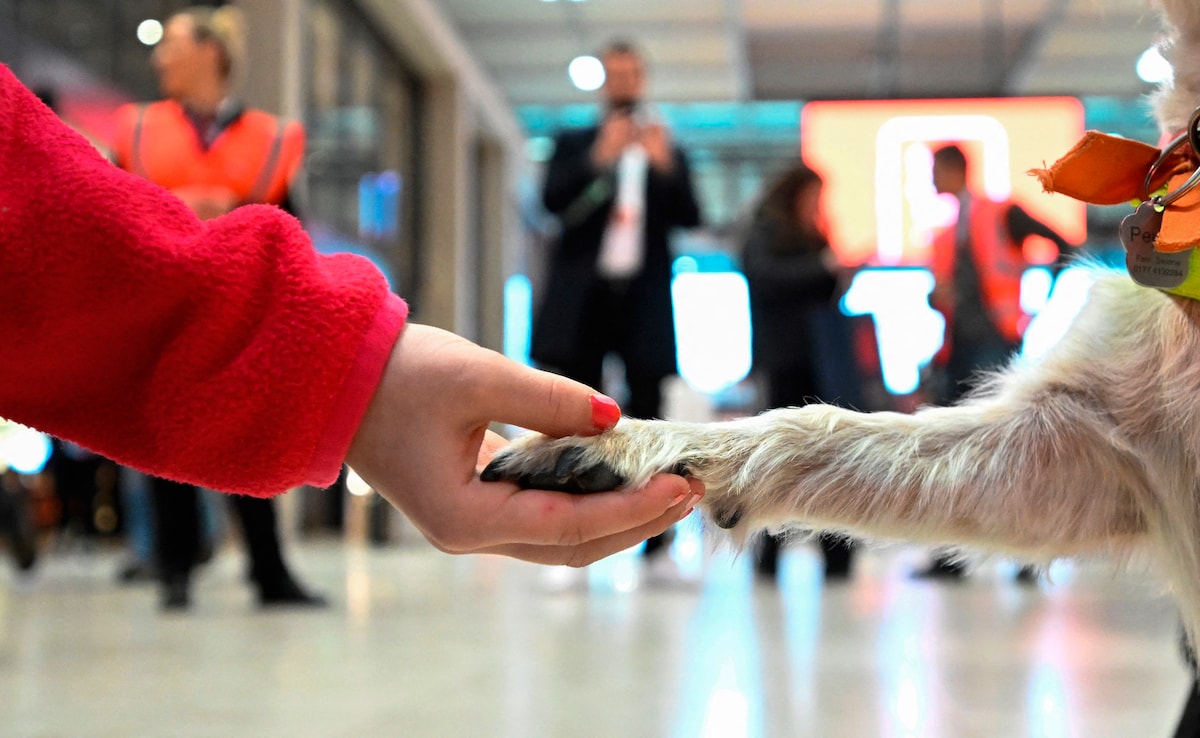
BER is Germany’s second-least popular airport (AFP)
Berlin, Germany:
Benny waddles up to eight-year-old Maya, performs a cheerful pirouette on his short hind legs and then nuzzles in for a cuddle.
Already a little cranky from the long wait for her flight to Turkey with her family, Maya is instantly besotted with the four-year-old dachshund and her father Michael Uth a bit less harried.
Berlin’s massively delayed, absurdly over-budget, far too small international airport BER, which opened in 2020 to heaps of scorn, has had to get creative to try to win over weary passengers.
A pilot programme is dispatching three particularly good-natured pooches along with two human trainers as on-the-ground stress relief ambassadors.
At the start of the autumn school holiday rush, Benny along with black Labrador Emi and Pepper, a terrier mix, were on their impish mission at Germany’s third busiest airport.
Patrolling the shiny floors of the terminal on long leashes, it doesn’t take long to find travellers who could use a little comfort or entertainment.
Uth arrived at BER with Maya and five-year-old son Vincent three hours early for a three-hour flight to Antalya.
“This gives them something fun to do,” Uth, 38, said as his children played catch with the pups.
“It’s keeping their minds off the wait and the stress with all the crowds here. Happy kids is a great start to a trip.”
Social media storm
BER airport had been called “cursed” by local media after the opening was delayed by nine years amid incessant technical difficulties and allegations of corruption.
Its six-billion-euro ($6.4-billion) cost was three times more than planned and BER finally opened just as air travel collapsed with the coronavirus pandemic.
The facility needed a hefty bailout to stave off bankruptcy, with taxpayers asked to pump in nearly two billion euros by 2026.
Passengers often report huge check-in queues and big delays for baggage retrieval due to staff shortages.
BER is Germany’s second-least popular airport, according to a poll by claims management company AirHelp, after former military airfield Frankfurt-Hahn.
Although conditions have generally improved, a recommendation that passengers allow at least 2.5 hours to reach their flights sparked a storm on social media.
There were bitter comparisons with the capital’s decommissioned airport Tegel, which was famed for direct access to check-in gates from a taxi drop-off point.
Airport spokesman Jan-Peter Haack admitted BER had a rocky start but touted now “very stable” operations with nearly 20 million passengers served last year.
He said innovations like an option to book a time slot at the security gates at no extra cost and self-service check-in and bag-drop machines had cut the crush at various chokepoints.
But on busy days, tempers can run high.
The stress relief dogs, an idea from Los Angeles’s international airport, have drawn “very good feedback” from BER passengers, Haack said.
“The dogs only approach people who are really receptive — no one is forced,” he said.
Elisabeth Tornow, 69, who travels often to the Swiss city of Basel to visit her family, said boarding particularly frayed her nerves.
“I’m not the youngest anymore and you have to climb the stairs and get pushed around finding your seat,” said the retired office manager.
Unable to manage the nighttime walks, Tornow had to let her own pet go when her husband died. Playing with Pepper, she said all airports could be improved with a few furballs.
“It just calms you down when a dog’s around,” she said. “I wish I had a treat with me.”
‘Tantrum over’
Trainer Joerg Utech, 63, volunteers with the Therapy Dogs Association Brandenburg and was on his third outing at BER.
The former IT specialist said he first saw the dogs in action five years ago when his wife was dying of cancer at a care home.
Since then, he’s watched the animals charm and engage the elderly, help fidgety children focus in school and calm fearful air travellers.
He said the patrols required a special kind of animal.
“They’ve got to have a calm temperament but love to play too,” he said.
“You have to be careful that you don’t have them out for more than an hour though because this is a lot of work for a dog. And if one is having a bad day and is showing us he’s unhappy then we stop immediately.”
Utech said screaming children remained the biggest challenge.
“The first time we were here, a family came along with a child who really didn’t want to sit in the stroller,” he said.
“My colleague was there immediately with Pepper who danced for a treat. The tantrum was over and the holiday could begin.”
(Except for the headline, this story has not been edited by NDTV staff and is published from a syndicated feed.)








